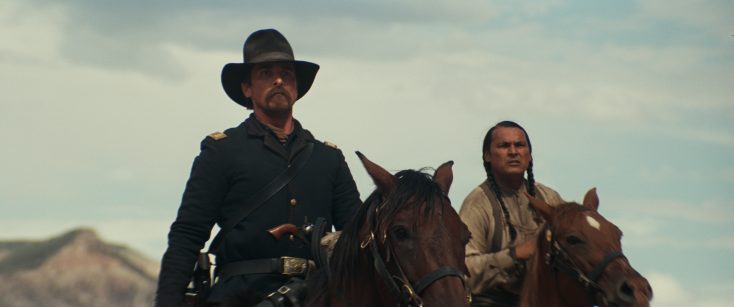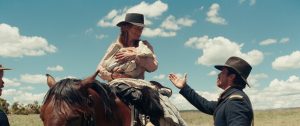By ANGELA DAWSON
Front Row Features
HOLLYWOOD—A stocky, bald man dashes into a hotel suite apologizing profusely for being late.
“I was taking my kids to school this morning and I realized I’d forgotten that it was Pajama Day, so we had to go back to the house and get them,” he explains.
The frazzled father of two (with wife Sandra Blazic) is none other than Oscar-winning actor Christian Bale (“The Fighter,” “The Dark Knight” movies), who is casually dressed in a grey shirt, black Dickies work jacket and camo pants. He is here a week before Christmas to promote his new film, the Scott Cooper-directed Western “Hostiles.” The actor also explains that he has been in production playing former Vice President Dick Cheney in Adam McKay’s political drama “Backseat,” due in theaters next year.
The British actor plays a U.S. Calvary Captain during the waning days of the 19th century. Angered and exhausted from the senseless brutality of the Indian Wars, he is counting the days to his retirement. When Captain Blocker (Bale) is called upon to escort a dying Cheyenne Chief from New Mexico to his native Montana tribal land, he does so reluctantly. Given a few men to help escort Chief Yellow Hawk (Wes Studi) and his family to their destination, he sets off on the long, dangerous final mission. Along the way, the group faces hostile Comanche warriors and picks up a newly widowed settler (Rosamund Pike), who has lost her entire family to the “hostiles.” Along the 1,000-mile journey, Blocker is tasked with delivering an unrepentant soldier who is to be executed for atrocities he has committed against Native Americans, and he begins to understand that his own hatred against the native peoples is unfounded and misguided. Ultimately, he discovers tolerance and compassion.
Bale, 43, previously had worked with Cooper, who also wrote the screenplay, on 2013’s drama “Out of the Furnace.” Sitting alongside Chief Phillip Whiteman and Lynette Two Bulls, who served as consultants on the Northern Cheyenne dialect on “Hostiles,” Bale spoke about portraying the battle-fatigued military man who experiences enlightenment.
Q: What attracts you to these types of roles?
Bale: That’s a therapists’ couch question, really. I think the fashion in which I grew up lent itself towards me feeling very comfortable expressing comfortable expressing myself through characters. Also, the lack of steady, the fact that I didn’t study acting. It lent itself to that. And there’s just an enjoyment in pushing the envelope. The fact that I didn’t study acting means that I don’t have a “technique.” I just look at each and every character and decide what I have to do. I don’t put a limit on what I have to do to achieve it.
Q: What did you do for this one?
Bale: For this one, I had to get into the mindset of man who’s been fighting his entire life, who’s incredibly good at what he does. He is incredibly intelligent and understands the flaws in the whole planning of this (mission). He knows he is attacking people who are defending their homeland and is part of an intended genocide. His personal tragedies have created a genuine hatred for the killers of his brothers-in-arms but he understands that if he traded places with Yellow Hawk (Studi), he’d act exactly the same way. He’s actually very interested in many (of the Native American) nations, but right now, more specifically, the Cheyenne. He’s intensely curious about it so he’s learned the language and tried to understand their way of thinking and yet he’s still killing. It’s a journey about how do you stop that. How do you turn off hatred when you’ve had that hatred for so many years? When you’ve fought for so many decades. Your default is to fight. For him, it’s the guilt of stopping that because he’s had friends and brothers-in-arms die so does stopping it render their deaths meaningless?
Even though this story is a particularly American story, and America, in its short history, has had such a violent history, I think it’s universally understood and there are comparisons in mostly every country.
Chief Phillip and Lynnette helps me a great deal in understanding. He was very curious about me when we began because he wouldn’t teach me Cheyanne, and so I thought we were just going to do it phonetically. And he said, “No, you have to understand the thinking. You have to understand the belief. You have to understand that before I’ll start to teach you,” and that informed my performance so much because it made me understand how much Blocker is denying the possibility of any alternative. He’s a soldier; he has to obey orders, but he’s an intelligent soldier, and his journey back to humanity and attempting to learn how to turn off the hatred, to turn off the fighting, and to be able to be among people again is very much informed by the teachings of the Cheyenne and his understanding of that through Yellow Hawk.
Q: Do you retain that information that you’ve learned once the film is over?
Bale: It’s not just something fascinating to Blocker, but it’s fascinating to me as well. I start getting worried when I start talking about myself in the third person because (President Donald) Trump does that, doesn’t he? I don’t want to do anything that he does. Clearly, I enjoy this obsession very much. I owe it to myself. I owe it to the people I’m working with. And I owe it to the people who are going to go watch the film. You have to get obsessed about what you do because otherwise why should they get excited to come see your film? That, of course, changes. There’s nothing about Yellow Hawk or the Cheyenne culture that I could bring to my portrayal of Dick Cheney. (He laughs.) Unless it was a very different kind of film. But, yes, all of these things stay with me. It’s one of the richest parts of doing this job is having the pleasure of meeting people like Chief Phillip and Lynette, and that education.
Q: Chief Phillip not only taught you the language but about the culture of his people. What did you take away from that?
Bale: That not only was fascinating but it enhances the film so much. That was something that Scott (Cooper) and I didn’t realize when we first contacted Chief Phillip. We thought we would just be able to learn the language but it enhanced so much the philosophy of the film and Blocker being such an ultra-linear thinker. But he understands this way of thinking. He knows there’s a different way. It’s also recognizing in ourselves. When the Chief starts doing these exercises, you feel a bit silly and a bit uncomfortable but even his talking is like beautiful poetry. I disagree with nothing he says. What he says is exactly how we should be living. But there’s a wall that goes up where some people don’t want to hear it. It’s about knocking down that wall and that’s what Blocker’s journey is, where he is able to embrace life in a way that is more about the process of life, rather than the reward. Whereas Blocker has always been about the reward. You have a goal, you achieve a goal and that’s the success, rather than the moment to moment existence and the process of the way you live your life being the success. That helped me so much in learning how to play this character and I hope that comes through in the film. As the chief says, I hope it goes way beyond the film.
Q: What do you think about the current zero-tolerance climate for sexual harassment in Hollywood?
Bale: There’s a large opportunity right now with all the sexual assault allegations, there’s a shift in cultural perspective in war philosophy about refugees, etc., in the whitewashing of casting that so often takes place in movies. There is a potential for so much more interesting dialogue and far more fascinating movies, if we do finally embrace that, and stop having this old fogey attitude much like Washington has of old white dudes running everything.
Q: You spoke of “the fashion in which you grew up.” What do you mean by that?
Bale: I was sort of rootless. I never grew up in one place for any length of time. I never considered friendships would last for a long time. I never joined sports clubs because I knew I would be leaving soon. I always felt like I was a temporary visitor in places. That lends itself to self-creation and reinvention because you’re anonymous so many times, arriving in so many different towns and places. That’s what I mean that it lends itself to enjoying, maybe needing it a little bit, grasping onto different characters and exploring them more.
Q: Did you feel lonely or just anonymous?
Bale: There’s some sadness in not having experienced what I see what other people have experienced, where they have very tight-knit families and they have neighborhoods and communities, and they really get to understand each other. There’s a history there and they really feel a sense of belonging. I didn’t get that but, ironically, I think that it was actually a plus in terms of acting. That’s also what Chief Phillip was referring to as a larger community and a sense that we have where you don’t see very much nowadays. Look at the use of social media where you have the correlation with real depression and anxiety with that. These incredible successes that we’re having but at the same time, there’s a feeling of emptiness inside too.
Q: What else did you learn from Chief Phillip?
Bale: It’s about enjoying the process rather than the reward. I’ve always had a notion of that being my goal but Chief Phillip articulates that in a way that is very resonate and meaningful. These blessings in the morning would have crew members weeping. He creates something very raw in individuals who have not been spoken to that way before or heard that kind of message before. But I would say enjoy the process and not just striving for a reward.






